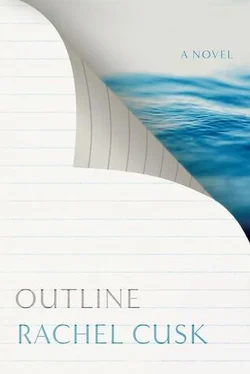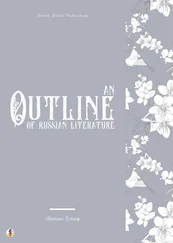We were driving along by the water now, past scruffy-looking beaches where families were picnicking and swimming, past roadside shops selling parasols and snorkels and swimming costumes. My neighbour said that we were nearly there; he hoped I hadn’t found the journey too long. He should mention, he said, lest I was expecting something grand, that his boat was quite small. He had owned it for twenty-five years, and it was steady as a rock in a gale, but it was of modest proportions. It had a small cabin where one person could comfortably spend the night, ‘or two people,’ he said, ‘if they are very much in love’. He often spent the night there himself, and at certain times of year he would take the boat across to the island, a journey of three or four days. It was, in a sense, his hermitage, his place of solitude; he could motor just offshore, anchor it, and be completely alone.
At last we came in sight of the marina, and my neighbour pulled off the road and parked the car alongside a wooden pontoon where a line of boats were tied to their moorings. He asked me to wait there, while he went and bought some supplies. Also, he said, there were no facilities on the boat, so I should make myself comfortable before we left. I watched him walk back up toward the road and then I sat down on a bench in the sun to wait. The boats moved up and down in the bright water. Beyond them I could see the clear, crenellated shapes of the coast, and of a number of rocks and small islands that lay further out to sea, strung all across the bay. It was cooler here than in the city. The breeze made a dry, shuffling sound in the vegetation that stood in tangled clumps between the sea and the road. I looked at the boats, wondering which one belonged to my neighbour. They all seemed more or less alike. There were people around, mostly men of my neighbour’s age, padding up and down the pontoon in deck shoes or working on their boats, their grizzled chests bare in the sun. Some of them stared at me, slack-jawed, their great ropy arms hanging by their sides. I took out my phone and dialled the number of the mortgage company in England, who were processing an application I had made just before I left for Athens to increase my loan. The woman who was dealing with the application was called Lydia. She had told me to call her today, but every time I tried I got her voicemail message. The message said that she would be out of the office on holiday until a date that had already passed, which gave the impression that she didn’t listen to her voicemail very often. Sitting on the bench I got the message again, but this time — perhaps because I didn’t have anything else to do — I left a message myself, saying that I had called as agreed and asking her to call me back. After this apparently pointless exercise, I looked around and saw that my neighbour was returning holding a carrier bag. He asked me to take it while he made the boat ready, and then he crossed the pontoon and getting down on his knees drew a length of sodden rope out of the water, with which he proceeded to pull the boat attached to the other end towards him. The boat was white, with wooden cladding and a bright blue canopy. There was a large black leather steering wheel at the front and an upholstered bench seat along the back. When it was close enough my neighbour hopped heavily on board and stretched out his hand for the carrier bag. For a while he busied himself stowing things away and then he held out his hand again to help me over. I was surprised to find myself not especially sure-footed in this exercise. I sat on the bench seat while he took the covers off the steering wheel and lowered the engine into the water and tied and untied numerous ropes, and then he stood at the wheel and started the engine, which made a watery growling sound, and we began to reverse slowly out of the marina.
We would drive for a while, my neighbour called above the noise of the engine, and when we reached a nice place he knew, we would stop and swim. He had removed his shirt, and his bare back faced me while he drove. It was very broad and fleshy, leathery with sun and age, and marked with numerous moles and scars and outcrops of coarse grey hair. Looking at it I felt overcome with a sadness that was partly confusion, as though his back were a foreign country I was lost in; or not lost but exiled, in as much as the feeling of being lost was not attended by the hope that I would eventually find something I recognised. His aged back seemed to maroon us both in our separate and untransfigurable histories. It struck me that some people might think I was stupid, to go out alone on a boat with a man I didn’t know. But what other people thought was no longer of any help to me. Those thoughts only existed within certain structures, and I had definitively left those structures.
We were out by now in the open water, and my neighbour put the boat into a different gear so that it suddenly leaped forward, with such force that unnoticed by him I nearly fell over the back. The thunderous noise of the engine instantly displaced every other sight and sound. I grabbed the rail that ran along one side and clung on as we roared across the bay, the front of the boat rising and thumping down again repeatedly on to the water and a great spray fanning out to all sides. I felt angry that he hadn’t warned me of what was about to happen. I couldn’t move or speak: I could only cling on, my hair standing up on end and my face growing stiff with the pressure of wind. The boat thumped up and down and the sight of his bare back at the wheel made me angrier and angrier. There was a certain self-consciousness in the set of his shoulders: this was, then, a performance, a piece of showing off. He didn’t once glance back at me, for people are at their least aware of others when demonstrating their own power over them. I wondered what he would have felt if he’d arrived at our destination to discover that I was no longer there; I imagined him explaining this latest piece of carelessness to the next woman he met on an airplane. She kept pestering me to go out on the boat, he would say, but it turned out she didn’t know the first thing about sailing. To be perfectly honest, he would say, it was the full disaster: she fell overboard, and now I am very sad.
At last the sound of the engine died away; the boat slowed, and puttered towards a small rocky island that rose steeply out of the sea. My neighbour’s phone rang and he looked quizzically at the screen before answering it. He began to speak mellifluously in Greek, pacing about the small deck and occasionally checking the steering wheel with a finger. I saw that we were approaching a clear little cove where many seabirds perched on the rocky promontories, and where the glittering water whirled and retreated against a tiny curl of sand. The island was too small to have anything human on it: it was untouched and deserted, except for the birds. I waited for my neighbour’s conversation to conclude, which took a considerable amount of time. Eventually, though, he hung up. That was someone I haven’t spoken to in many years, he said — in fact I was very surprised that she should call me. He was silent for a while, his finger on the steering wheel, his face sombre. She just heard about my brother’s death, he continued, and she was calling to give her condolences. I asked when his brother had died. Oh, four, five years ago, he said. But she lives in the States and hasn’t been back to Greece for a long time. She’s here now on a visit, so she’s only just got the news. His phone rang again almost immediately, and again he answered it. It was another Greek conversation, this one also lengthy but a little more businesslike. Work, he explained when it concluded, making a brushing gesture with his hand.
The boat drifted to a halt in the lapping water. He came to the back and opened a compartment, inside which lay a small anchor, and he hauled it by its chain over the side. This is a good place to swim, he said, if you would like to. I watched the anchor fall down through the clear water. When the boat was secured my neighbour stepped up on to the stern and dived heavily over the side. Once he had gone I wrapped a towel around myself and changed awkwardly into my swimming costume. Then I jumped in, swimming out in the opposite direction all the way to the perimeter of the island so that I could see the open sea beyond it. The other way, the distant shore was a bobbing line full of tiny shapes and figures. In the meantime another boat had arrived and was anchored not far from ours, and I could see the people sitting out on deck and hear the sound of their voices talking and laughing. They were a family group, with numerous children in bright costumes jumping in and out of the water, and now and again the sound of a baby wailing echoed thinly around the cove. My neighbour had got back on the boat and was standing there with his hand screening his eyes, watching my progress. It felt good to swim, after the tension of sitting still, of the heat of Athens and of spending time with strangers. The water was so clear and still and cool, and the shapes of the coastline so soft and ancient, with the little island nearby that seemed to belong to nobody. I felt that I could swim for miles, out into the ocean: a desire for freedom, an impulse to move, tugged at me as though it were a thread fastened to my chest. It was an impulse I knew well, and I had learned that it was not the summons from a larger world I used to believe it to be. It was simply a desire to escape from what I had. The thread led nowhere, except into ever expanding wastes of anonymity. I could swim out into the sea as far as I liked, if what I wanted was to drown. Yet this impulse, this desire to be free, was still compelling to me: I still, somehow, believed in it, despite having proved that everything about it was illusory. When I returned to the boat, my neighbour said he didn’t like it when people swam too far out: it made him nervous; there were speedboats that could come out of nowhere, without warning, and such collisions were not unheard of.
Читать дальше












